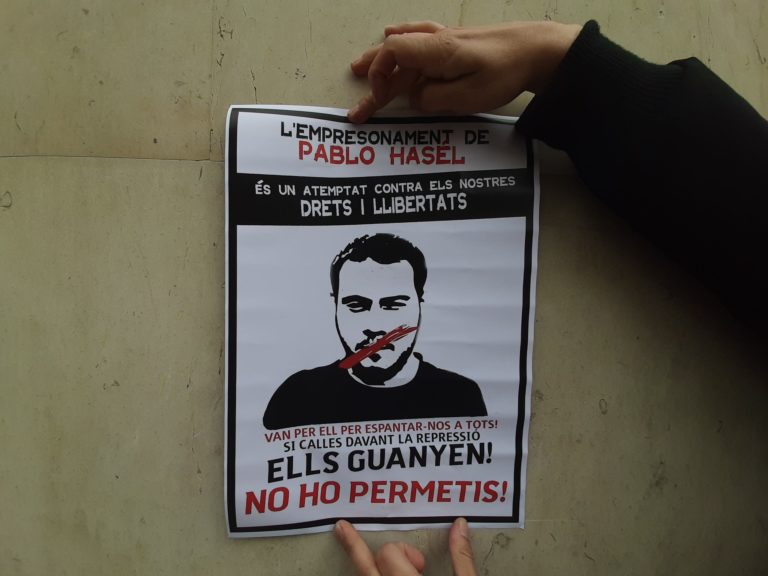
Pablo Hasél has been sentenced to 9 months of prison for criticizing the Spanish monarchy in songs and tweets.
This Tuesday, 16th of February, police broke through a barricade set up at the University of Lleida (Catalonia), where Catalan rapper Pablo Hasél had resisted his prison sentence for the content of his lyrics. A large group of activists had joined him, protesters were also outside of the building, and demonstrations will take place across Catalonia to denounce this new attack to his freedom of speech.
The Spanish Supreme Court convicted Pablo Hasél for the glorification of terrorism, insults, and slander against authorities such as the Spanish Crown and the police. The Court imposed a sentence of nine months and one day in prison in addition to a hefty fine. This sentence is added to another he received in 2015, in which he was sentenced to two years for similar acts and which, being the first, was suspended and did not lead to his imprisonment.
The case against Pablo Hasél is based on a series of messages of artistic and political content published online between 2014 and 2016. They include tweets in which he criticizes the Spanish Crown, known for its alleged corruption and businesses with authoritarian regimes. In his songs, Hasél criticizes, among other things, the proven relationship between Spanish King Juan Carlos and the King of Saudi Arabia, as well as the fact of allegedly spending millions of euros from the public budget at the expense of the more vulnerable population.
These judgments of both the Supreme Court and other Spanish courts are contrary to international and European standards of freedom of expression and the European Court of Human Rights’s jurisprudence.
The case of Pablo Hasél is a new, exemplary punishment against activists and artists for having exercised their legitimate right of freedom of expression, freedom of assembly, and self-determination. But it is not only us Catalans that have protested about this. International organizations and NGOs working in human rights, such as the United Nations, Amnesty International, or the Council of Europe, have condemned these actions by Spanish authorities. Moreover, a report published by international NGO Freemuse in April 2020, denounced that Spain not only was the country in the world with most imprisoned artists -more than authoritarian regimes such as Iran or Turkey- but that it held 31% of the world cases of misuse of counter-terrorism law against artists.
The Spanish Government has been systematically prosecuting artists, rappers, and activists for using their freedom of speech. Spain has already indicted several well-known artists, as in the cases of César Strawberry or Valtònyc. The Spanish state’s repressive tidal wave against the people of Catalonia in the form of rights violations goes beyond these cases. The persecution of political dissidents in Spain has not ceased. At the present moment, over 3.090 Catalan activists are being prosecuted for exercising their rights to freedom of assembly and taking part in peaceful protests in October 2019 against the prison sentences for nine Catalan political and civil leaders.
For these reasons, the application of these provisions in the case of Pablo Hasél is hugely worrying. We are concerned about its potential to create a chilling effect on freedom of expression for the whole society, as many Catalans are increasingly afraid to engage in public life. Spain’s authoritarian trend is a matter that concerns us all. It is shameful for Spain, but also disgraceful for Europe.
Repression needs to be stopped. Freedom for Pablo Hasél! #FreePabloHasel
More information about the case of Pablo Hasél:
Hasél: “The Spanish government breaks its promises, the ‘Gag Law’ has been extended.”
Sending Pablo Hasél to prison is “unfair and disproportionate,” according to Amnesty International.
Amnistía Internacional: ”Es injusto y desproporcionado que Pablo Hasél entre en la cárcel”